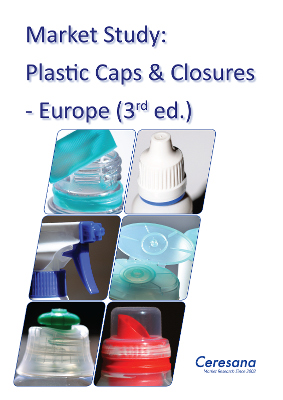Ceresana analyses the European market for plastic caps and closures
Changing lifestyles and new consumer generations revolutionise the packaging market. “The uninterrupted trend towards on-the-go products, for example, is boosting the demand for resealable packaging, especially in the food sector,” explains Oliver Kutsch, CEO of the market research institute Ceresana. “On the other hand, more and more countries try to reduce waste and promote reusable bottles or recycling.”
For the third time, Ceresana has analysed the European market for plastic caps and closures, from beverages and food items, cosmetics and pharmaceuticals (OTC) to household chemicals and other applications. Various subcategories and closure types are examined in detail. With regard to the number of units sold, Ceresana expects an increase in European sales of lids, overcaps, flip-top closures, dispensers, and other closures of around 2.4 % per year until 2026.
Closures for flexible packaging
Plastic caps and closures are becoming increasingly popular on the market for flexible packaging. Stand-up pouches are light, handy, save raw materials, and offer versatile design and print options. In the beginning, they were lacking practical spout openings and could not be resealed. By now, however, there is a wide array of suitable stand-up pouches with integrated and resealable spouts for liquids, viscous materials, creams, and other applications. Due to the small size of these closures alone, manufacturers have to meet different requirements than those for traditional screw caps.
Unquenched thirst for mineral water
Each application area requires specific closure properties. This also has an effect on the design, raw material, and choice of cap. In addition to the change in packaging types such as the trend towards stand-up pouches, other factors also influence the demand for plastic caps and closures. Consumer health concerns and state taxes on sugary beverages inhibit the demand for carbonated soft drinks or fruit juices in many countries. By contrast, demand for packaged water will likely continue to show high growth rates in the coming years. In the food sector, ready meals and other convenience foods in particular constitute expanding markets. However, the individual parameters and the resulting market dynamics can vary considerably from region to region.
Strong growth for lids and overcaps in the food sector
This market study examines the demand for the following types of plastic closures in 22 countries (e.g. Russia, Switzerland, and Turkey): “screw caps”, “flip-top and disc-top closures”, “dispensers and sprays”, as well as “lids and overcaps”. Plastic lids and overcaps are recording high growth rates, especially in the food sector. The trend towards convenience products currently leads to a significant increase in demand – with no end in sight for this development.
The study in brief:
Chapter 1 offers an overview of the European Market for plastic caps and closures, including forecasts until 2026. Data on production and demand volumes as well as on the individual closure types and application areas are listed in clear tables and figures.
Chapter 2 analyses production, demand, as well as import and export for 22 individual countries. Demand is split by these application areas: lemonades (carbonated soft drinks), water, fruit juices, other non-alcoholic beverages, alcoholic beverages, sauces and condiments, ready meals and convenience food, dairy products, spreads and other food, cosmetics and personal care, pharmaceuticals (OTC), household chemicals, and other applications. In each case, a distinction is made between the following closure types: screw caps, flip-top and disc-top closures, dispensers and sprays, and lids and overcaps.
Chapter 3 presents useful company profiles of the largest manufacturers of plastic caps and closures – clearly arranged according to contact details, revenues, profit, product range, production sites, profile summary, as well as product types and application areas. In-depth profiles of 77 producers are provided (i.e. Gerresheimer AG, Alpla-Werke Alwin Lehner GmbH & Co. KG, Ball Corporation, Colep Portugal, S.A., Coveris Holdings S.A., Greiner Packaging International GmbH, Groupe Guillin Holding, Huhtamaki Oyj, Mauser Holding GmbH, Nolato AB, Plastek UK Ltd., RPC Group Plc., and Tetra Laval Group).

